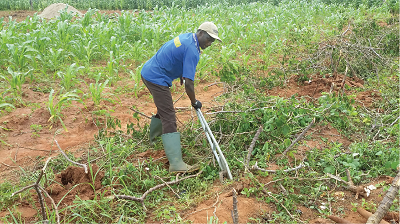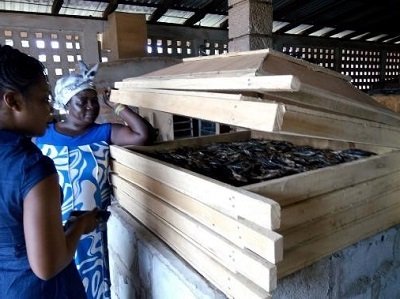Hot!
Fact sheet about agric equipment in Ghana

IT is interesting to note that: • Improved manual cassava harvester was released in 2017. Harvesting, one of the serious bottlenecks in the cassava production value chain, has received little attention in terms of mechanization. Earlier attempts at mechanising cassava harvesting have been challenged mainly by inappropriate method of planting, field topography and scale of cultivation.

Developing and adopting simple but efficient energy-saving manual harvesting tools and equipment is a sure way forward in overcoming these challenges in cassava harvesting. The cassava harvesting tool was constructed with the idea of reducing drudgery due to waist bending associated with existing manual harvesting tools which usually leads to waist pains and other bodily weaknesses.
The equipment is suitable for all cassava growing ecologies in Ghana. The improved hand-held tool can harvest cassava twice as fast with half the effort required when using existing manual harvesting options. Farmers have increased their production area and yield by 15-25 per cent after being introduced to the harvester.
• Recirculating aquaculture technology was released in 2015. Simple raised tanks that can be set in the backyard with minimal skill requirement. This technology is an aquaculture system composed of a raised tank structure (rectangular, circular or ellipsoid) made of either a cement block or wooden frame and lined with a canvas material to make. It is applicable to all cassava growing parts of the country. It can be done in homes.
• New oven for smoking fish (AFSMO-150)/ Ahotor stove was released in 2007. A brick oven which reduces tar deposition on smoked fish with increased fish smoking capacity. Ahotor stove is applicable in all fishing communities in Ghana. It is less laborious to operate, has higher smoking capacity, it is more economical to use because it consumes less fuel, and it deposits less tar on the fish and, therefore, produces better quality smoked fish.
• Improved Chorkor smoker (AFSMO) was released in 2005. This technology is to help to reduce Poly-aromatic Hydrocarbons (PAHs) in smoked fish and reduce the drudgery involved in the other means of smoking fish. The use of fuel wood is reduced. Chorkor smoker is applicable in all fishing communities in Ghana. It reduces PAH in smoked fish which makes it healthy.
• Flash Dryer- drying of root crops cakes, was released in 2004. A typical flash-drying process consists of a modified pneumatic conveyor in which the wet solids are introduced. They go through a chute where they are transported in a high velocity hot air stream. Particles fall under high velocity and pressure through a cyclone (in some instances 2, 4 or 6 cyclones).
Thermal contact time between the conveying air and the solids is usually very short and, therefore, flash dryers are most suitable for removal of external moisture.
It is applicable in all parts of the country. Compared to solar drying (two days for drying) and cabinet drying (12-15hrs), flash dryer dries one ton of cassava (for example) in 1hr 30mins. Flash dryer dries in a flash. Flash Dryer is fast, and temperature build-up after an hour is enough to keep on drying without fuel. It can utilise either LPG or diesel in operating. Capacity is between 250- 500kg/ hr output 7. It requires little oversight after temperature build-up.
Source: Manual of Agricultural Technologies developed by CSIR, MAG and MoFA Page: 133-136
Hot!
Africa investment network partners 17 Asset Management to boost diaspora investment

The Africa Investment Network has entered a new partnership with 17 Asset Management to expand investment opportunities for Africans in the diaspora.
The two organisations will work together to open more pathways for diaspora investors, provide better data on markets, and connect investors to viable projects across the continent.
The partnership will focus on mapping investment opportunities across countries and sectors, building a Diaspora Pathways Program to guide new investors, and creating a shared research platform that provides market insights, returns benchmarks, regulatory updates and sector outlooks.
The two groups will also develop a trade and deal catalogue to help match businesses with partners.
As part of the collaboration, both institutions will host investment roadshows through the Global Africa Summit series, starting with GAS Accra from December 11 to 12 at the Alisa Hotel.
The event will showcase deals, hold sector briefings and connect investors with government and private sector actors.
Africa Investment Network founder and Chief Executive Jane Reindorf Osei noted that diaspora capital remains one of Africa’s strongest advantages because it is patient, purpose driven and closely linked to local development outcomes.
She explained that the partnership will help direct more diaspora investment into areas where it can make the most impact.
Chairman of 17 Asset Management, John Morris, highlighted that the joint effort will blend strong investment design with Africa Investment Network’s networks and convening power.
He stressed that improved research and compliant market access will give diaspora investors more confidence across different markets.
The two institutions will open their diaspora investment platform in the second quarter of 2026, followed by the launch of a co investment window.
Investment roadshows will also be held in North America, the Caribbean and key African centres next year.
Africa Investment Network and 17 Asset Management invited governments, development finance institutions, family offices, asset managers and other partners to support deal creation, risk sharing and market building initiatives aimed at boosting diaspora participation.
By: Jacob Aggrey
Hot!
NDC has not filed any petition for removal of EC Chair and her deputies-Felix Kwakye Ofosu

Government Communications Minister Felix Kwakye Ofosu insists that neither President Mahama nor the National Democratic Congress has filed any petition seeking the removal of the Electoral Commission Chairperson and her two deputies.
In a one on one Interview with GHone, he explained that the President only forwarded petitions he received, as required by law, and has not initiated any action against the EC leadership.
According to him, the identities and motives of the petitioners remain unknown to government, and the Presidency is not involved in that part of the process.
Mr Kwakye Ofosu stressed that while the NDC has openly disagreed with some actions of the Electoral Commission in the past, the party has not submitted any petition asking for the removal of the EC Chair or her deputies.
He noted that comments by the NDC National Chairman, Johnson Asiedu Nketiah, questioning the EC’s competence, do not amount to a formal petition.
He added that criticism of public officials is normal and does not automatically translate into a request for their removal.
Mr Kwakye Ofosu explained that once a petition is received, the President’s only role is to forward it to the Chief Justice.
The Chief Justice then decides if the allegations have merit. If they do, a committee is set up to investigate.
He said those named in the petitions will be officially informed by the Chief Justice, not the Presidency.
They will then have the opportunity to appear before the committee, respond to the claims, and provide any evidence in their defence.
Mr Kwakye Ofosu expressed confidence that the process will be fair and will protect the rights of all those involved.
By: Jacob Aggrey






